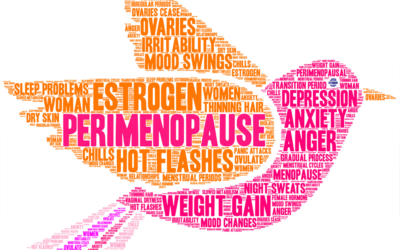

Are You Navigating the Symptoms of Perimenopause?

When I was in my mid-forties I started experiencing a number of seemingly unrelated symptoms – weight gain, brain fog, sore joints, and fatigue. I tried all sorts of one-off fixes – diets, exercise programs, and magic pills – without success. It wasn’t until my period started changing and I experienced hot flashes that the penny dropped and I connected everything to perimenopause. Did it happen like that for you too?
I wonder why there isn’t more talk about perimenopause? After all, it happens to all ladies, although it’s true that some have more challenges with it than others.
Perimenopause (and menopause) is the bookend to puberty, the reproductive part of our lives. So it includes a lot of hormone changes as the reproductive hormones – primarily estrogen and progesterone – naturally decline.
But the real challenge comes with how those changes impact our wellbeing. Like mood swings, inability to sleep, extreme fatigue, joint pain, digestive issues, hot flashes, night sweats, low sex drive and weight gain. What’s up with all that? Why can’t we just wind up our periods and call it a day?
There are two paths for getting help with perimenopause. The medical path and the lifestyle path. Unfortunately, many doctors are not well equipped to help. The American Association of Retired Persons reports most medical schools and residency programs don’t teach physicians in training about menopause. To make matters worse, a recent survey found that just 20% of ob-gyn residency programs provide any kind of menopause training.
When asked, 3 out of 4 ladies reported they did not get adequate treatment when they brought perimenopausal and menopausal concerns to their doctors. And 84% of women say their symptoms interfere with their lives and some are even debilitating.
One of the main areas where doctors should be able to help is in prescribing Hormone Replacement Therapy (HRT). Even though treatment has changed dramatically over the past decade, many doctors are unaware. The new body identical treatment is administered in patches or gel and poses none of the earlier health concerns for breast cancer and heart disease. The topical delivery method means that the liver is completely bypassed, and that absorption through the skin dramatically changes the health risks. Dr. Louise Newson, The Menopause Doctor, goes so far as to encourage women to consider taking body identical HRT for the protections it provides against heart disease, osteoporosis, diabetes and Alzheimer’s.
The other path to get help with the symptoms of perimenopause is through lifestyle. There is a lot that lifestyle habits and behaviors can do to demystify the changes. It turns out the healthy practices of diet and exercise that ladies maintained before perimenopause are unlikely to suit them very well once they enter perimenopause. As our nutrition needs change, so does our digestion. We no longer need all the protein we used to eat, and our sensitivity to sugar and processed foods heightens. Bloating, brain fog, joint pain and weight gain result.
And with hormonal changes to our muscles and joints, the type of exercise and movement that is beneficial also changes. Even if you have always been athletically active, the fatigue and joint pain can make ambitious workouts very difficult. In fact, high impact and anaerobic exercise can cause stress to the system and result in the production of cortisol, the stress hormone. The timing and type of movement you choose take on new importance.
Hormonal changes impact sleep, especially when combined with food choices and stress. So figuring out new sleep hygiene habits are vital to being able to restore the body each night with quality sleep. As we sleep, the body is busy removing dead cells burning fat and rebuilding tissue. The brain catalogues the day’s experiences and builds up memories. Without adequate sleep, the body is stressed when it cannot carry out these maintenance functions and produces cortisol in response. That in turn stimulates appetite, which produces more insulin leading to fat production (and stubbornly stored around the middle). So getting enough good sleep is vital to being able to adapt through the changes of perimenopause.
And finally, mindfulness – getting your head in the game is so important. As it happens, the mind can only focus on one thing at a time. So if you control some of the things you tell yourself and make them positive things, you will benefit from that. Rather than tell yourself that you’re a lazy slob or beat yourself up because you don’t have enough willpower, you tell yourself that you’re an intelligent woman and the goal is achievable. Meditation is a great way to calm the mind, focus on positive things and create endorphins. This can really help to create positivity, reduce cortisol levels and help with sleep.
Are you satisfied with the support your doctor has been giving you for the symptoms of perimenopause? Some symptoms are best resolved using HRT. But many more can be resolved by taking a lifestyle approach.
The beginning of my perimenopausal journey didn’t go well, and I’m determined to help ladies navigate this chapter of their lives so they can take control of the next decades and live their best lives.
To find out how you can navigate the symptoms of perimenopause, click the button to book your free call with Dyna Vink, Health and Nutritional Coach.
Health Benefits of Low Carb Living

It’s a myth that low-carb eating causes heart disease because of its high-fat content. As more research is completed, low-carbohydrate diets are being identified as healthy and beneficial in some unexpected areas.
These diets not only lead to greater weight loss but also reduces most risk factors related to diseases connected with obesity. Let’s go through some other health benefits:
Reduces acne
Of course, acne can be caused by a number of different things, but the major one is related to diet and blood sugar. By eating high levels of processed and refined carbohydrates, it can change gut bacteria and lead to significant blood sugar fluctuations – both linked to acne. So by limiting the consumption of carbohydrates, and the associated insulin spikes, a low carb diet can reduce the instance of acne.
Brain protection
Early research results indicate the low-carb diet may provide some neuroprotective benefits. This may help prevent conditions like Parkinson’s and Alzheimer’s. One study has shown that eating a low-carb diet can even reverse symptoms of these diseases, and also some sleep disorders.
Improves heart health
While there is new controversy about the relevance of cholesterol to heart health, several studies indicate that the ketogenic diet can reduce LDL (“bad”) cholesterol and increase HDL (“good”) cholesterol levels. And removing bad fats is also good for blood and artery health.
Reduce the risk of cancer
More and more research shows that a low-carb way of eating can be used as a complementary treatment to chemotherapy and radiation for people with cancer. The advantage is that the food selections cause more oxidative stress in cancer cells than in normal cells. And since many cancers are spurred by sugar, removing that from the body makes it a poor host to cancer.
Reduces blood sugar spikes
Eating according to a low-carb lifestyle can help with blood sugar regulation. A diet that includes a lot of carbs means they are converted to glucose. As the body burns glucose, it generates mood swings, energy crashes, and potential problems regulating insulin. By contrast, a low-carb diet reduces high blood sugar surges and therefore reduces the production of insulin.
Reduction of seizures
There is evidence that a low-carb diet changes how the body uses energy, resulting in ketosis. Ketosis has been shown to reduce seizures in people with epilepsy.
Reversal of Diabetes and Prediabetes
The incidence of diabetes is increasing at alarming rates. It’s usually characterized by changes in metabolism, high blood sugar, and weakened insulin function. A low carb diet is able to reduce insulin production and studies have shown that significant numbers of people have been able to come off or significantly reduce their medication. Weight loss tends to be slower with this group, but it is proving to be a wise and sustainable choice.
Risks and complications
The low carb way of eating has a large number of health benefits, but there are also some risks. Some research has identified kidney stone formation and acidosis (high levels of acid in the blood). People with pre-existing conditions should consult with their doctor about incorporating the low-carb diet into their treatment plan.
There is mounting evidence that a low-carb lifestyle helps people lose weight and feel better in ways that other programs have not. By focusing on quality food in good proportions, we see that millions of people are improving their health and gaining a new appreciation for the food that they eat.

Holistic Nutrition Lifestyle | Copyright © 2025 | All Rights Reserved
“This site is not a part of the Facebook website or Facebook Inc. Additionally, this site is NOT
endorsed by Facebook in any way.
FACEBOOK is a trademark of FACEBOOK, Inc.”